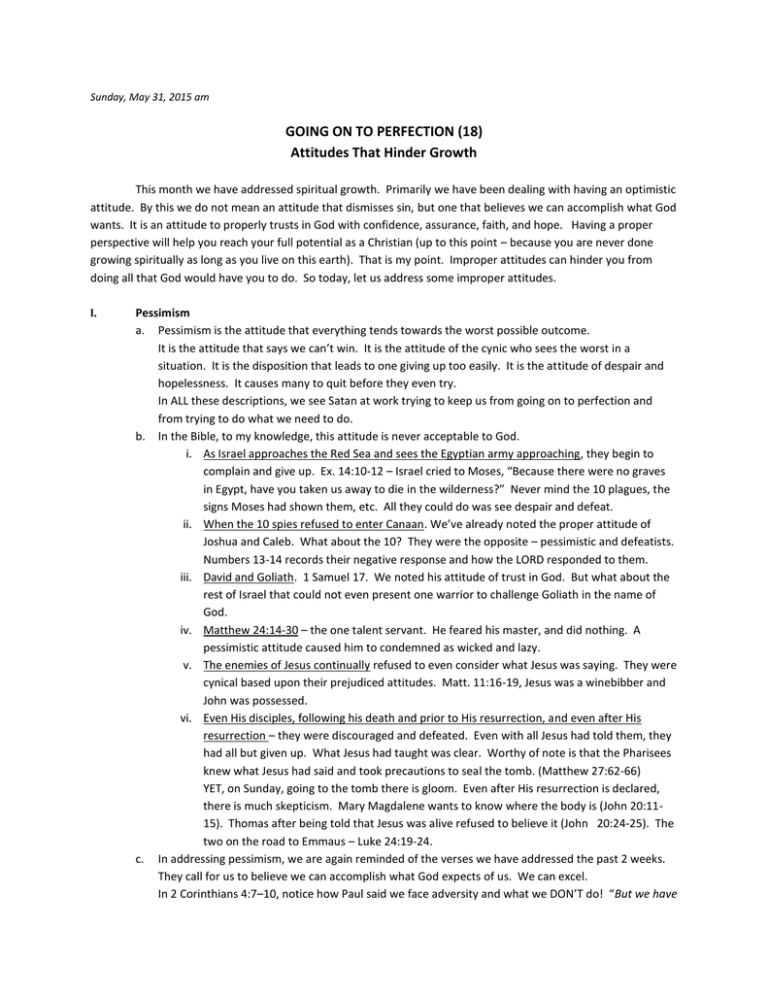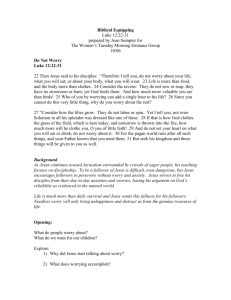Word
advertisement

Sunday, May 31, 2015 am GOING ON TO PERFECTION (18) Attitudes That Hinder Growth This month we have addressed spiritual growth. Primarily we have been dealing with having an optimistic attitude. By this we do not mean an attitude that dismisses sin, but one that believes we can accomplish what God wants. It is an attitude to properly trusts in God with confidence, assurance, faith, and hope. Having a proper perspective will help you reach your full potential as a Christian (up to this point – because you are never done growing spiritually as long as you live on this earth). That is my point. Improper attitudes can hinder you from doing all that God would have you to do. So today, let us address some improper attitudes. I. Pessimism a. Pessimism is the attitude that everything tends towards the worst possible outcome. It is the attitude that says we can’t win. It is the attitude of the cynic who sees the worst in a situation. It is the disposition that leads to one giving up too easily. It is the attitude of despair and hopelessness. It causes many to quit before they even try. In ALL these descriptions, we see Satan at work trying to keep us from going on to perfection and from trying to do what we need to do. b. In the Bible, to my knowledge, this attitude is never acceptable to God. i. As Israel approaches the Red Sea and sees the Egyptian army approaching, they begin to complain and give up. Ex. 14:10-12 – Israel cried to Moses, “Because there were no graves in Egypt, have you taken us away to die in the wilderness?” Never mind the 10 plagues, the signs Moses had shown them, etc. All they could do was see despair and defeat. ii. When the 10 spies refused to enter Canaan. We’ve already noted the proper attitude of Joshua and Caleb. What about the 10? They were the opposite – pessimistic and defeatists. Numbers 13-14 records their negative response and how the LORD responded to them. iii. David and Goliath. 1 Samuel 17. We noted his attitude of trust in God. But what about the rest of Israel that could not even present one warrior to challenge Goliath in the name of God. iv. Matthew 24:14-30 – the one talent servant. He feared his master, and did nothing. A pessimistic attitude caused him to condemned as wicked and lazy. v. The enemies of Jesus continually refused to even consider what Jesus was saying. They were cynical based upon their prejudiced attitudes. Matt. 11:16-19, Jesus was a winebibber and John was possessed. vi. Even His disciples, following his death and prior to His resurrection, and even after His resurrection – they were discouraged and defeated. Even with all Jesus had told them, they had all but given up. What Jesus had taught was clear. Worthy of note is that the Pharisees knew what Jesus had said and took precautions to seal the tomb. (Matthew 27:62-66) YET, on Sunday, going to the tomb there is gloom. Even after His resurrection is declared, there is much skepticism. Mary Magdalene wants to know where the body is (John 20:1115). Thomas after being told that Jesus was alive refused to believe it (John 20:24-25). The two on the road to Emmaus – Luke 24:19-24. c. In addressing pessimism, we are again reminded of the verses we have addressed the past 2 weeks. They call for us to believe we can accomplish what God expects of us. We can excel. In 2 Corinthians 4:7–10, notice how Paul said we face adversity and what we DON’T do! “But we have this treasure in earthen vessels, that the excellence of the power may be of God and not of us. We are hard-pressed on every side, yet not crushed; we are perplexed, but not in despair; persecuted, but not forsaken; struck down, but not destroyed—always carrying about in the body the dying of the Lord Jesus, that the life of Jesus also may be manifested in our body.” II. Worry a. Worry is defined as anxiety or uneasiness. It is allowing one’s mind to dwell on problems and difficulties. Worry is a struggle with many. It is often a symptom of the pessimist. It can cause one to not do something that needs to be done for fear of failure. Beyond that there are many problems with worry – it can cause health concerns, it can affect the way you treat others, it can consume our time, it can rob us of joy and peace, and it can even stand in the way of prayer because worry often involves a lack of trust. b. In Luke 8:14 Jesus spoke of the soil with thorns being descriptive of the “cares, riches and pleasures of life, and bring no fruit to maturity.” Worry is clearly a form of the “cares” of this world. In Luke 10:38-42, Jesus is visiting Mary and Martha. Martha was distracted with serving. Jesus said, “Martha, Martha, you are worried and troubled about many things…” c. In Matthew 6:25-34 we find Jesus giving the classic text addressing worry. He tells us to not worry. - In the text we find it is forbidden – “Do not worry” (25, 31, 34) – worry is disobeying God. - It is unnecessary since God knows what we need (vs. 32) - It is useless because you usually can’t change your situation (vs. 27). It has been shown that the substantial amount of worrying is over things we cannot change, things that have already happened and things that are inevitable to happen, and things that will (probably) never happen. - It is the way of the world – (vs. 32) after these things the Gentiles seek. - It demonstrates a lack of faith in God (vs. 30) d. There is a time for genuine concern – but the idea of worry is unnecessary dwelling on things, particularly what you cannot change. Phil. 4:6-7 calls for us to be anxious for nothing, but to let our requests be made known to God. III. Doubt a. Another attitude that stands in the way of reaching forward is doubt. The idea of doubt is uncertainty, a lack of confidence or seeing something that is unlikely. Biblically, it is a lack of faith! Like worry, it has many concerns. One who doubts will not pray properly. He is likely to underperform because he lacks confidence in himself. He fails to trust in God and times in others. He might even fail to believe in himself enough to change for the better. Doubt caused Peter to sink (Matthew 14:30-31); It caused some to doubt that Jesus arose (Matt. 28:17,Luke 24:38); It caused Abraham to lie about Sarah, twice (Gen. 12:10-13, 20:1-2) and numerous other examples that show how it is not a good attitude. Again, it is a quality of the cynic. b. Doubt affects our relationship with God – Heb. 11:6 tells us without faith we cannot please Him. James 1:5-7 with doubt our prayers are not acceptable to God (cf. 1 Timothy 2:8) Doubt can cause us to question the power of God. Again consider Phil. 4:13 as one example. It can even cause us to question His word – as so many are doing today. Do we His word is able to make us complete (2 Tim. 3:16-17). Acts 20:32, Paul concluded his remarks to the Ephesians elders by commending them to God and the word of His grace “which is able to build you up and give you an inheritance among all those who are sanctified.” c. d. e. Doubt can affect our belief in others – are we able to turn to our brethren? (Rom. 12:10. 1 Thess. 5:11 calls for us to comfort and edify one another). Do we give our brethren the benefit of the doubt in matters (1 Cor. 13:6)? Do we assume the best or the worst in a given circumstance? Jesus trusted His disciples! That is why He gave them the work He did and encouraged them. When we lose faith in our brethren, or in mankind, we are destined to live a miserable life. Philemon 21 Paul said, ““Having confidence in your obedience, I write to you, knowing that you will do even more than I say.” 2 Thess. 3:4, “But the Lord is faithful, who will establish you and guard you from the evil one. And we have confidence in the Lord concerning you, both that you do and will do the things we command you.” Galatians 5:10, “I have confidence in you, in the Lord, that you will have no other mind…” 2 Corinthians 8:22 speaks of his “great confidence which we have in you...” (cf. Rom. 15:14) Doubt can affect our belief in ourselves – far too many today let their failures keep them from moving forward. They dwell on them. Some dwell on the way they were mistreated by another. Or their misfortunes. Friends, we CANNOT dwell on our past! Such a disposition is NEVER good and with it you will never reach your full potential and you will be miserable. Paul said he forgot the past and moved on (Phil. 3:13-14). NOTE in this text that Paul is not just talking about failures, but whatever has happened in the past. Jesus in Luke 9:62 said, “No one having put his hand to the plow and looking back is fit for the kingdom of God.” This is not saying we don’t learn from the past for that is folly. To fail to learn is to repeat. That is what addiction is about. Paul learned from his past. He NEVER forgot what he did to Christians. BUT, he forgave himself and he accepted the forgiveness of God! 1 Tim. 1:12-15 – Christ came to save sinners, “of whom I am chief.” 1 Cor. 15:10 he said, “By the grace of God I am what I am.” He remembered his past, but he was DETERMINED to not return to it! This does not mean we do not question some things - we ought to make sure of our salvation. Acts 17:11 describes the noble minded Bereans, “These were more fair-minded than those in Thessalonica, in that they received the word with all readiness, and searched the Scriptures daily to find out whether these things were so.” 1 John 4:1 tells us to test the spirits whether they are of God. The doubt we are addressing here is a lack of faith as we have seen. And thus we can see the need to have a proper mindset. We need to believe we can accomplish what God wants of us. We need to believe we can change for the better. We need to believe we can go on to perfection. Let us resolve to do things that will promote that type of attitude and avoid the attitudes that hinder such. Jude 20-21 says, “But you, beloved, building yourselves up on your most holy faith, praying in the Holy Spirit, keep yourselves in the love of God, looking for the mercy of our Lord Jesus Christ unto eternal life.” Let that be our goal. Think about it!









